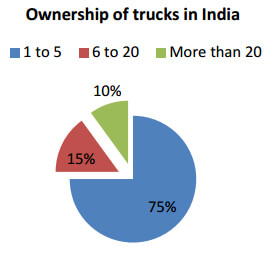India's trucking industry to see a rebound by tech-startups
2016 was not an impressive year for many startups in India and the logistics sector was not an exception. According to a news report, as many as 212 startups had to wind up their operations including 6 logistics startups; these were – TheKarrier, Truckmandi, Trucksumo, Loadkhoj, Zaicus and Sastabhada.
However, 2017 seems to be a good year for such startups – India has been ranked second only to China on Emerging Markets Logistics Index, 2017. The index gauges the logistics industry in the world’s 50 leading emerging markets by size, business conditions, and infrastructure and transport connections. This is for the second consecutive year that India has been rated among the most favorable investment destinations across the globe.
GST to make an impact on transit times
Much has already been written about the impact of recently implemented GST (goods and services act) in India. The Act is likely to put the truck industry in the fast lane, literally. Trucks in India used to travel only 280 km on daily basis; in the US the corresponding figure is 800 km. With GST being implemented, they can add 164 km per day to their transit schedule. Further, reduction in paperwork and border checks will cut transportation cost by 20-30 per cent. All this will improve operating margins for truck operators.
The lingering challenges for the industry
For small time entrepreneurs in India, launching a trucking business has always been an easy option. To buy a truck, easy finance is available readily with a down payment of only 10% to 15%. Further, after repaying the loan in 3-4 years, the same truck could be resold at around 75% of its original cost. Hence, a small operator can easily accrue a RoI of 500%-700% within 3-4 years time. Despite smaller profit margins, the business return over a period of 4 years is quite impressive. This is not a secret recipe. As seen in the graph below; 75% of truck operators (with a fleet size of 5 or below) rely on this business model.

Source: An Overview of the Trucking Sector in India: Significance and Structure, 2015
However, the above model works only for small fleet operators. Profitability ceases to increase in the same proportion when the fleet size increases. The business follows the law of diminishing returns, as operations and management costs increase rapidly with larger fleets. A decrease in asset utilization, route planning challenges, slower invoicing and liberal credit terms with customers make operations inefficient. To overcome all this, businesses are forced to include a higher administration overhead, without any significant change in returns. Meanwhile, unavailability of drivers continues to plague truck operators. All these inefficiencies compound fleet expansion.
Finding answers with technology
Tech-driven truck aggregators can make most of the lingering challenges in the industry. By using the tech-aggregation model, startups can allow individual fleet operators to expand without losing profitability. By offering benefits of scale they can reduce fragmentation in the industry. This is achievable as solutions built on artificial intelligence APIs, such as those offered by IBM, can assist fleet owners in route optimization for their vehicles and help them in increasing their asset utilization.
Further, real-time GPS-based vehicle tracking can bring transparency and reliability of service to India’s trucking industry which from the time immemorial has operated only on trust.
IoT is no more a buzzword and startups like Rivigo are already using IoT for real-time data collection of fuel, RPM, engine oil temperature, brake oil pressure and more. All this data can assist in predictive and diagnostic analysis like driver behavior, machine failures, diesel consumption and preventive maintenance.
Also, technology can help in reduction of paperwork such as that involved in lorry receipt, proof of delivery, and invoicing. Cloud-based solutions are particularly useful in this area. This anyway is going to be a mandate for operators as post GST implementation swift billing will be essential for customers to claim their GST input credits.
Investment climate
There is every likelihood that PE/VC funding will help more startups to capture this vast and expanding space. According to India’s pre-budget economic survey “growth could recover sooner than expected after a shock scrapping of high-value banknotes to fight black money.” Recent investment trends have also been positive; Venture Intelligence reports that funds worth $5 billion flowed in via PE/VC route in 2016, an almost 10 per cent rise over 2015. Tech-startups with a strong business model and a long-term execution strategy can expect to make the most of this positive investment climate.
Credencys Solutions Inc is a leading software development services and solutions provider which has helped numerous businesses in their business growth. We can help you in building a custom fleet management solution. Know more about our services here.








Comments are closed.